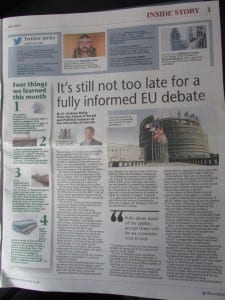This article first appeared in ‘The Business’ supplement to The Lincolnshire Echo, June 2016.
 The European Union has changed beyond all recognition from the economic community Britain joined in 1973. It is now an economic and political union with a common foreign and security policy, its own parliament, a common currency and open borders which extend across large parts of its twenty-eight member states. For those campaigning for Britain to leave, and even amongst some of those who would like to remain, there is a feeling that the so-called ‘European project’ has moved forward at a dizzying pace, driven by forces over which we have little control.
The European Union has changed beyond all recognition from the economic community Britain joined in 1973. It is now an economic and political union with a common foreign and security policy, its own parliament, a common currency and open borders which extend across large parts of its twenty-eight member states. For those campaigning for Britain to leave, and even amongst some of those who would like to remain, there is a feeling that the so-called ‘European project’ has moved forward at a dizzying pace, driven by forces over which we have little control.
On the other hand the EU is very much the product of the community which Britain was eager to join in the 1970s. The shape of the community which Britain joined was set out in the 1957 Treaty of Rome, which promised to ‘lay the foundations for an ever closer union among the peoples of Europe.’ For forty years successive British governments have signed treaties which have expanded the remit of the EU. At the same time, far from being bounced into ever closer union, Britain has a consistently negotiated opt-outs from those aspects which it does not support. Margaret Thatcher successfully negotiated a rebate on Britain’s contributions and opted out of the workers’ rights included in the Maastricht Treaty. Britain is not a member of the Eurozone or part of the Schengen area which has removed border controls, while David Cameron has, amongst other things, negotiated Britain’s exclusion from the founding principle of ‘ever closer union’.
Of course the debate about Britain’s membership of the EU is not simply an argument about the past. As economic uncertainty has spread across the continent, some argue that EU membership is an unnecessary drain on Britain’s resources. The inconvenient truth for the ‘remain’ campaign is that Britain is a net contributor to the EU. While British membership does not cost anywhere near the £350m a week which has been claimed, Britain does pay more into the EU than it gets out.
However, this has not always been the case. Britain was the poor man of Europe when it joined the European community. As a booming economy it now contributes towards the development of other states. While some will argue that there are real benefits to promoting economic prosperity across Europe, creating stability and markets for British goods, those opposed to the redistribution of wealth at home are unlikely to support it abroad. It is also important to remember that in some areas, Britain still benefits considerably from EU funding. In agriculture and research and development, for example, EU funding to the UK exceeds the EU average.
Less easy to calculate than the cost of membership are the economic benefits of being part of the largest trading bloc in the world. The EU is Britain’s most significant trading partner. The ‘leave’ campaign argue that as the fourth largest economy in the world, Britain is more than capable of standing on its own two feet. However, they are unclear about where Britain’s economic future lies. Exit would certainly mean considerable economic uncertainty. Britain would be forced to negotiate a trade deal with the EU which may take considerable time and in doing so would still be required to retain many EU regulations in order to maintain trade relations.
Polls indicate that the majority of the public, including those who think Britain should leave, accept there will be an economic cost to exit. Whether this is a price worth paying may depend on how one feels about other aspects of the EU. At the centre of this debate is an argument about sovereignty or control.
It is often claimed that membership of the EU means that Britain has lost control of its borders. Although this is not the case, the free movement of labour has seen an influx of foreign workers into the UK. Businesses, including Lincolnshire farmers, have benefited considerably from this, but immigration has also created tensions in communities where some feel it has placed pressure on local services.
There is also a widespread view that the EU is run by unelected bureaucrats who make decisions which are somehow imposed on the member states. The reality, of course, is more complex. The EU is an institution comprised of a large number of independent states and membership inevitably involves comprise. Decisions in Brussels are taken by Commissioners appointed by the member states or by the Council of Ministers which includes British Cabinet Ministers, and then approved by the European Parliament, which we elected. The system is by no means perfect, democracy rarely is, but nine times out of ten Britain gets what it wants.
Sadly much of the debate has focused on general perceptions of what membership involves rather than how and why the EU exists and the real benefits and the undoubted costs of membership. It is not too late for an informed debate.
